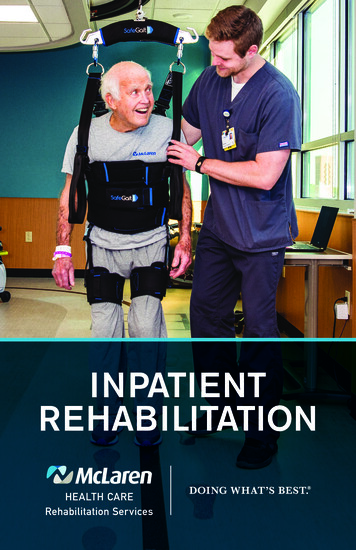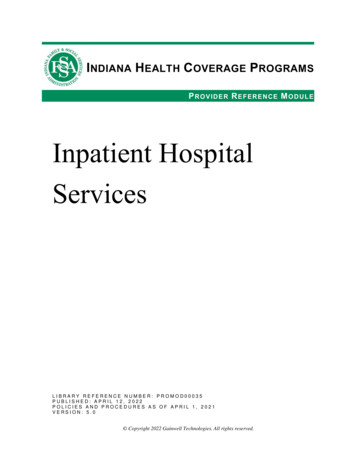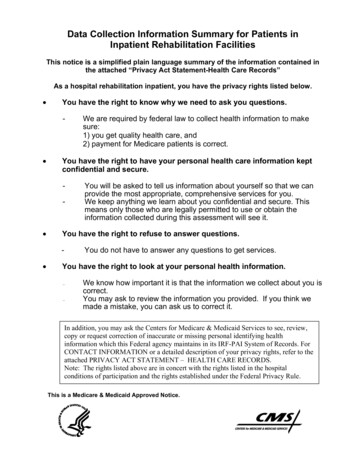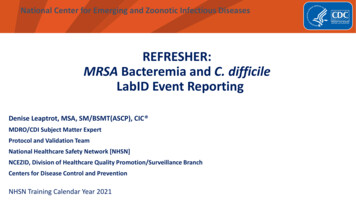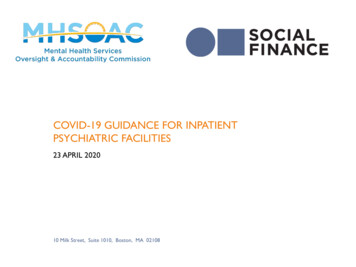
Transcription
COVID-19 GUIDANCE FOR INPATIENTPSYCHIATRIC FACILITIES23 APRIL 202010 Milk Street, Suite 1010, Boston, MA 02108
These materials were prepared as part of the Rapid Response Network, a jointinitiative between the California Mental Health Services Oversight andAccountability Commission (MHSOAC) and Social Finance, Inc. to supportjurisdictions in fast-paced research and decision making driven by COVID-19.The network aims to facilitate connections among jurisdictions facing similar challenges,and to supplement that shared experience with support from external experts—in order todeliver fast, customized, digestible research and analysis that strengthens local capacity.We recognize that the pace of these responses means that they are likely to be bothincomplete and imperfect. If you have suggestions for improvement or questions aboutthese materials, we would love to hear from you. Please email Jake Segal(jsegal@socialfinance.org) or Sean Burpoe (sburpoe@socialfinance.org).With gratitude for the support of the Robert Wood Johnson Foundation and invaluable inkind support from GLG, which supports the RRN through access to their expert network.2Social Finance, Inc. 2020 Confidential
EXECUTIVE SUMMARY The most complete resource issuing guidance specifically for inpatient psychiatric facilitieswe found was developed by New York State’s Office of Mental Health. Among other items,OMH advised:1 Maintaining hospital-wide standards related to COVID-19 Discontinuing group therapy Lessening documentation requirements Upon discharge, foregoing outpatient appointment requirements if they are unavailablewithin 7 days Where it exists, other state-level guidance – including from California, Colorado, and NorthCarolina – is limited and primarily related to discharge, telehealth waivers, and billing.2 As of April 20, federal guidance for inpatient psychiatric care specifically is limited to a twopage set of interim considerations from SAMHSA,3 and some, including leaders from theAmerican Psychiatric Association, have called for more extensive guidance.4 Most other guidance, including for engaging with non-directable clients, is generic and/orextrapolated from that for residential treatment facilities, homeless service providers, anddetention centers.1. Thomas Smith, “Treatment Planning and Documentation Standards for Article 28/31 Hospital Psychiatry Providers During EmergencyPeriod,” New York State Office of Mental Health, 25 March 2020.2. See slide 6 of this resource for more information on state-level responses.3. “Covid19: Interim Considerations for State Psychiatric Hospitals,” Substance Abuse and Mental Health Services Admin., 18 March 2020.4. Jeffrey L. Geller and Margarita Abi Zeid Daou, “Patients With SMI in the Age of COVID-19: What Psychiatrists Need to Know,” AmericanPsychiatric Association, 7 April 2020.Social Finance, Inc. 2020 Confidential3
CONTEXTCOVID-19 guidance has been limited for inpatient psychiatric facilities, whichface stark challenges due to the pandemic Those with mental health disorders are at higher risk for COVID-19 for several reasons, including:1 Difficulty to ensure personal protection due to environment or awareness of riskConfined psychiatric facilitiesBarriers to accessing timely health services (including mental health-related discrimination)Mental health disorder comorbidities, including high susceptibility to stressRegular interaction with outpatient clinics, which are largely closed COVID-19 guidance for inpatient psychiatric care facilities has been less prominent than that forlong-term care facilities, hospitals, and in jails and prisons. Inpatient psychiatric care facilities face unique challenges in the face of COVID-19, such asdetermining who to admit and what is a genuine emergency as well as in practicing social distancingamong inpatients in an environment in which treatment can include group activities.2, 3 Quarantine, isolation, and concern, all factors in the response to COVID-19, can lead to and/orexacerbate serious mental illness.41. Hao Yao, Jin-Hua Chen, and Yi-Feng Xu, “Patients with Mental Health Disorders in the COVID-19 Epidemic,” Lancet Psychiatry, April2020.2. “Hospitalization,” Mental Health America, 2020.3. EJ Dickson, “The Coronavirus Crisis in the Psychiatric Ward,” Rolling Stone, 13 April 2020.4. Jeffrey L. Geller and Margarita Abi Zeid Daou, “Patients With SMI in the Age of COVID-19: What Psychiatrists Need to Know,” AmericanPsychiatric Association, 7 April 2020.Social Finance, Inc. 2020 Confidential4
FEDERAL GUIDANCE FOR INPATIENT PSYCHIATRIC CAREWhile more limited than for long-term care facilities, for example, someguidance has been issued from federal entities for inpatient psychiatric care The Substance Abuse and Mental Health Services Administration issued limited “initialSAMHSAconsiderations,” cited by CMS and others, alongside brief considerations for mentalhealth care.1, 2 This guidance primarily mirrors that for all healthcare facilities. Considerations include maintaining awareness of psychosocial group treatment,partnering with paraprofessional staff to meet staff ratios, and increasing cleaning. The Centers for Medicare & Medicaid Services extended some hospital guidance toCMSpsychiatric hospitals, including enabling inpatients to be relocated to expand bedcapacity.3 The guidance advised special consideration before those with psychiatric or cognitivedisabilities are discharged to home if they have mild COVID-19 symptoms. A webinar for behavioral health organizations offers methods for minimizing exposureJointCommissionin community settings with overnight stays, including providing clear signage,increasing cleaning, avoiding crowded food distribution, relying on telehealth if possible,and following CDC guidance for institutions of higher education.4 Separate guidance issued for COVID-19 patients at risk of suicide advises that 1:1observation be conducted while maintaining view of the patient in a closed room.5AS OF APRIL 20, FEDERAL GUIDANCE FOR INPATIENT PSYCHIATRIC CARE SPECIFICALLY IS LIMITED TOA TWO-PAGE SET OF INTERIM CONSIDERATIONS FROM SAMHSA.1. “Covid19: Interim Considerations for State Psychiatric Hospitals,” Substance Abuse and Mental Health Services Admin., 18 March 2020.2. “Considerations for the Care and Treatment of Mental and Substance Use Disorders in the COVID-19 Epidemic: March 20, 2020,”Substance Abuse and Mental Health Services Admin., 20 March 2020.3. “Guidance for Infection Control and Prevention of Coronavirus Disease (COVID-19) in Hospitals, Psychiatric Hospitals, and CriticalAccess Hospitals,” Centers for Medicare and Medicaid Services, 30 March 2020.4. Sylvia Garcia-Houchins, Peter A. Vance, and Kathryn Petrovic, “Preparing Behavioral Health Organizations for Coronavirus,” NationalCenter for Behavioral Health and the Joint Commission, 23 March 2020.5. “Monitoring High Risk Patients with Known or Suspected COVID-19,” The Joint Commission, 9 April 2020.Social Finance, Inc. 2020 Confidential5
SPOTLIGHT: INSIGHTS FROM THE AMERICAN PSYCHIATRIC ASSOC.Leaders from the APA offered insights on how providers assisting those withserious mental illness (SMI) might operate in the face of COVID-191 COVID-19’s existence can lead to increased paranoia, delusions, hallucinations,cognitive deficits, disorganization, and anxiety among those with SMI. Symptoms will likely not abate if those with SMI have COVID-19. Crowding, lack of movement and disrupted patterns can lead to increasedoutbursts and, accordingly, increased staff exposure. Steps taken by inpatient hospitals: Restricting visitorsLimiting the movement of patients and/or restrict patients to their own unitMoving off-unit activities onto the unitHaving adequate PPE on handConsolidating coronavirus-positive patients By the authors’ assessment, additional guidance for inpatient facilities isnecessary.1. Jeffrey L. Geller and Margarita Abi Zeid Daou, “Patients With SMI in the Age of COVID-19: What Psychiatrists Need to Know,” AmericanPsychiatric Association, 7 April 2020.Social Finance, Inc. 2020 Confidential6
STATE-LEVEL GUIDANCEWith some exceptions (including NYS), state-level guidance is limited andprimarily related to discharge, telehealth waivers, and billingNew York State Office of Mental Health Maintain hospital-wide standards related to COVID19. Discontinue group therapy. Lessen documentation requirements. Upon discharge, forego outpatient appointmentrequirements if they are unavailable within 7 days.Colorado Office of Behavioral Health Enable verbal consent to treatment. Expand telemedicine, including to those isolated intheir rooms. Modify emergency licenses to enable behavioralhealth service provision in a statewide emergency. OBH advises consulting a guide developed by SignalBehavioral Health.California Department of Health Care Services If a patient exhibits symptoms, contact the localpublic health department and isolate the patient in aroom. Patients with COVID-19 may be admitted in theabsence of severe symptoms. Report staff diagnoses or investigations to DHCS.North Carolina Dept. of Health and Human Services As relevant, encourage ambulances to redirectpatients without COVID-19 symptoms and withbehavioral health systems from an emergencydepartment to alternative sites of care. Consider converting local behavioral health facilitiesinto crisis and assessment centers. Consider adopting policies for emergency forcedmedication. Many states have issued guidance contextualizing telehealth and in-state licensure waivers,1, 2 as well as detailingbilling instructions for telehealth.31. “States Modifying In-State Licensure Requirements for Telehealth in Response to COVID-19,” Federation of State Medical Boards, 15April 2020.2. “Medicaid State Plan Fee-for-Service Payments for Services Delivered Via Telehealth,” Centers for Medicare & Medicaid Services, 2020.3. Daniel Tsai, “MassHealth Coverage and Reimbursement Policy for Services Related to Coronavirus Disease 2019 (COVID-19),”MassHealth, March 2020.Social Finance, Inc. 2020 Confidential7
GUIDANCE ON ENGAGING WITH NON-DIRECTABLE PATIENTSResources for residential treatment facilities, homeless service providers, anddetention centers offered guidance that may be applicable Writing for intermediate care and residential treatment facilities, CMS advised having clients in theirroom with the door closed, and if that is not possible, having clients wear masks and maintain six-footsocial distancing. CMS also advised helping clients by adhering to CDC infection prevention andcontrol practices and maintaining some daily routines to the extent possible.1 Several resources, for example one for homeless service providers,2 identify mental health as a factorin leading an individual to have opposition to quarantine, pointing readers to generic guidance fromthe CDC about mental health and coping.3 In guidance for professionals interacting with individualsexperiencing unsheltered homelessness, the CDC advised contacting local health authorities ifindividuals do not comply with facility isolation requirements.4 Acknowledging that psychiatric facilities are not jails and prisons, APA president-elect Jeffrey Gellerand Margarita Abi Zeid Daou point to CDC guidance for correctional facilities as applicable to inpatientpsychiatric hospitals.5 Among other elements, the extensive CDC guidance advises regular verbalscreening and temperature checks for incarcerated/detained persons to counteract potentialhesitance to report symptoms.61. “Guidance for Infection Control and Prevention of Coronavirus Disease 2019 (COVID-19) in Intermediate Care Facilities for Individualswith Intellectual Disabilities (ICF/IIDs) and Psychiatric Residential Treatment Facilities (PRTFs),” CMS, 30 March 2020.2. “Interim Guidance for Homeless Service Providers to Plan and Respond to Coronavirus Disease 2019 (COVID-19),” CDC, 14 April 2020.3. “Stress and Coping,” CDC, 1 April 2020.4. “Responding to Coronavirus Disease 2019 (COVID-19) among People Experiencing Unsheltered Homelessness,” CDC, 22 March 2020.5. Jeffrey L. Geller and Margarita Abi Zeid Daou, “Patients With SMI in the Age of COVID-19: What Psychiatrists Need to Know,” AmericanPsychiatric Association, 7 April 2020.6. “Interim Guidance on Management of Coronavirus Disease 2019 (COVID-19) in Correctional and Detention Facilities, CDC, 9 April 2020.Social Finance, Inc. 2020 Confidential8
USEFUL RESOURCESIf you only have a few minutes or are looking for something specific New York State’s guidance for hospital psychiatry providers. Thomas Smith, “TreatmentPlanning and Documentation Standards for Article 28/31 Hospital Psychiatry ProvidersDuring Emergency Period,” New York State Office of Mental Health, 25 March 2020. Limited “interim considerations” for psychiatric hospitals from SAMHSA. “Covid19:Interim Considerations for State Psychiatric Hospitals,” Substance Abuse and MentalHealth Services Administration, 18 March 2020. Considerations for healthcare professionals providing care to those with serious mentalillness, including inpatient facilities. Jeffrey L. Geller and Margarita Abi Zeid Daou,“Patients With SMI in the Age of COVID-19: What Psychiatrists Need to Know,” AmericanPsychiatric Association, 7 April 2020. Thorough guidance for residential facilities, including for handling clients withsymptoms and for facility staff who are sick and/or facing staffing shortages. NationalCouncil for Behavioral Health, “COVID-19 Guidance for Behavioral Health ResidentialFacilities,” 25 March 2020.9Social Finance, Inc. 2020 Confidential
FEDERAL GUIDANCE FOR INPATIENT PSYCHIATRIC CARE While more limited than for long-term care facilities, for example, some guidance has been issued from federal entities for inpatient psychiatric care 1. "Covid19: Interim Considerations for State Psychiatric Hospitals," Substance Abuse and Mental Health Services Admin., 18 March 2020. 2.







